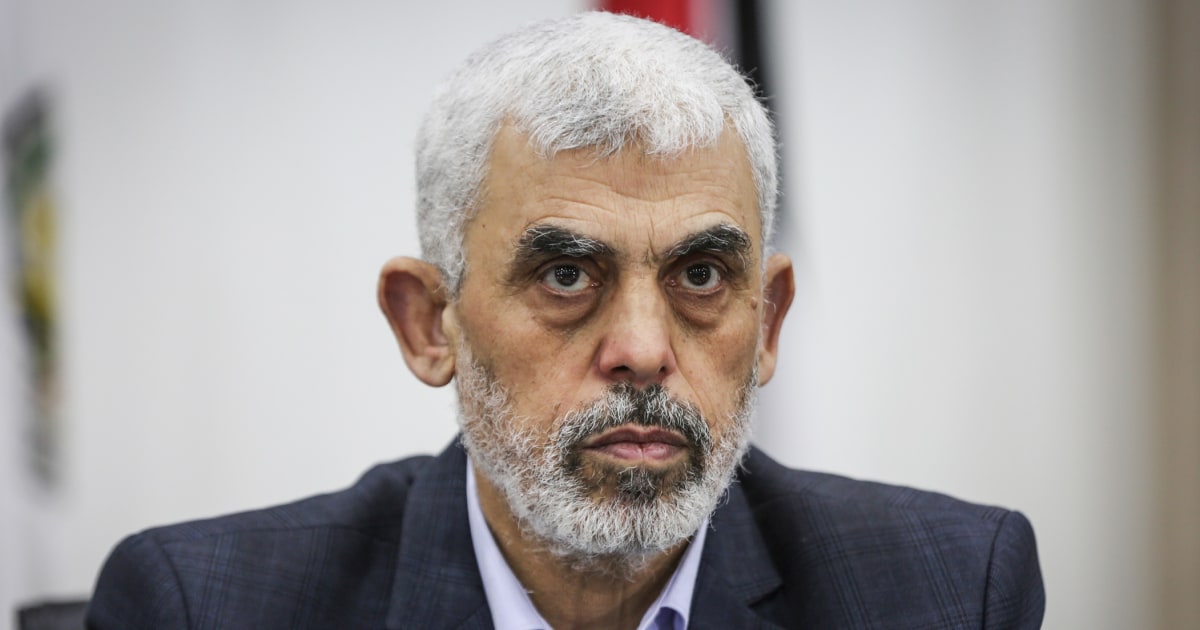The Israeli military said Thursday it is “checking the possibility” Hamas leader Yahya Sinwar was among three militants killed in Gaza during its operations in the enclave.
Sinwar was declared Hamas’ new political head in August following the assassination of Ismail Haniyeh.
If he is indeed dead, killing the man accused of being the architect of the Oct. 7 terror attack would be a major coup for Israel and its war in the Gaza Strip.
In a joint statement, the Israel Defense Forces and Israel Security Agency, or Shin Bet, said at least three militants were killed in a building during an operation in Gaza. They did not expand on how they were killed, but said they were investigating whether one of the three was Sinwar.
The IDF and Shin Bet said there were “no signs of the presence of hostages in the area” of the building where the three militants were killed.
“The forces that are operating in the area are continuing to operate with the required caution,” they added, saying more details would follow.
Israeli Defense Minister Yoav Gallant wrote in a post on X on Thursday: “‘You will pursue your enemies and they will fall before you by the sword.’ — Leviticus 26. Our enemies cannot hide. We will pursue and eliminate them.”
The IDF has previously vowed to capture Sinwar “dead or alive.”
National Security spokesman John Kirby said the U.S. was aware of reports Sinwar may be dead, but said government officials had not independently confirmed those reports.
Sinwar had been in charge of day-to-day governance in Gaza prior to Oct. 7, 2023 and was named Hamas’ new political head after Haniyeh was killed in an airstrike on his residence in Tehran.
Haniyeh had been attending the inauguration ceremony of Iranian President Masoud Pezeshkian. Israel, which typically remains silent on targeted assassinations, is believed to have carried out the attack.
Israeli officials blasted the Iran-backed militant group’s decision to install Sinwar as its political leader, with Israeli Foreign Minister Israel Katz calling Sinwar an “arch-murderer” and saying his appointment was “another reason to bring about his quick elimination and erasing the memory of this organization from the face of the earth.”
“There is only one place reserved for Yahya Sinwar and that is next to Mohammed Al-Deif, Marwan Issa, and the rest of the Hamas ISIS members responsible for the October 7 massacre whom we killed,” IDF spokesperson Avichay Adraee said at the time in a post on X.
Sinwar, who was born in a Gaza refugee camp in the early 1960s, joined Hamas after its founding in 1987 and helped establish its internal security force a year later, according to a profile of him by the European Council on Foreign Relations think tank.
He was sentenced to life in prison in 1988 for plotting to kill two Israeli soldiers, as well as the killing of four Palestinians he suspected of collaborating with Israel. He was released years later in 2011 as one of more than 1,000 Palestinian prisoners freed in exchange for Gilad Shalit, an Israeli soldier who had been held by Hamas for more than five years.
Sinwar quickly rose up through the ranks of the militant group and was elevated to its helm in a secret ballot in 2017.
The already elusive Hamas leader has been in hiding since Oct. 7 and was believed to have been concealed within the elaborate tunnel system used by Hamas militants in Gaza, according to Israeli officials.
Some 1,200 people were killed and around 250 others taken hostage into Gaza in the Oct. 7 Hamas-led attacks. Since then, 154 have been freed, with 101 hostages still held in Gaza, including 33 believed dead.
“I am hopeful that his personal reign of terror has ended,” Thomas Hand, the father of Emily Hand, who was released by Hamas as part of a temporary cease-fire deal in November, told NBC News of Sinwar.
“I hope that this heavy blow to their command structure will help bring an end to this terrible war,” he said. “Perhaps they will feel weakened enough to come to the table and finally make a serious deal to end the war and give us back our poor hostages after more than a YEAR in brutal captivity.”
More than 42,400 people have been killed in Gaza in the period of more than a year since Israel launched its offensive there following the attacks, the latest major escalation in a decadeslong conflict.
This is a developing story. Please check back for updates.


